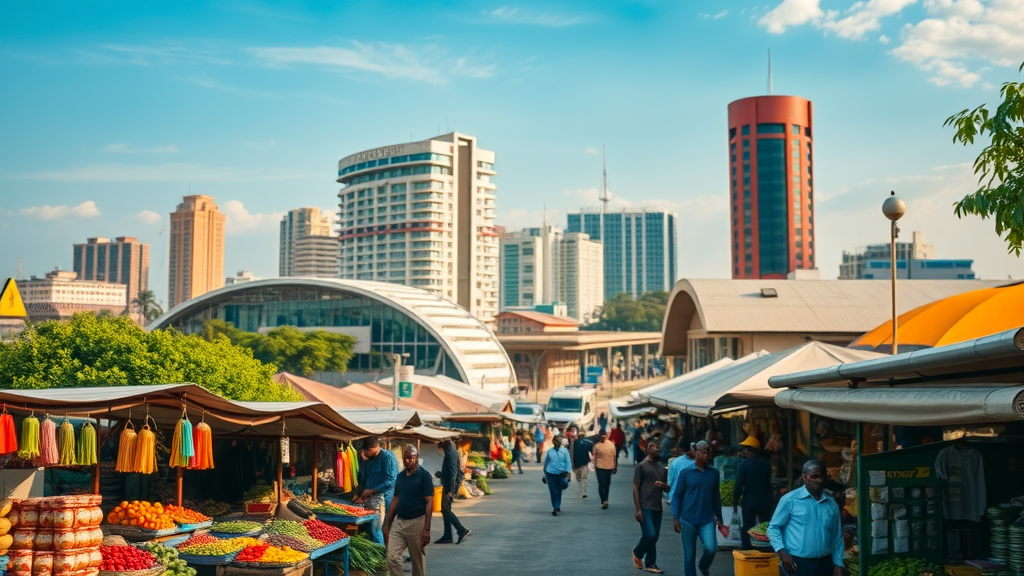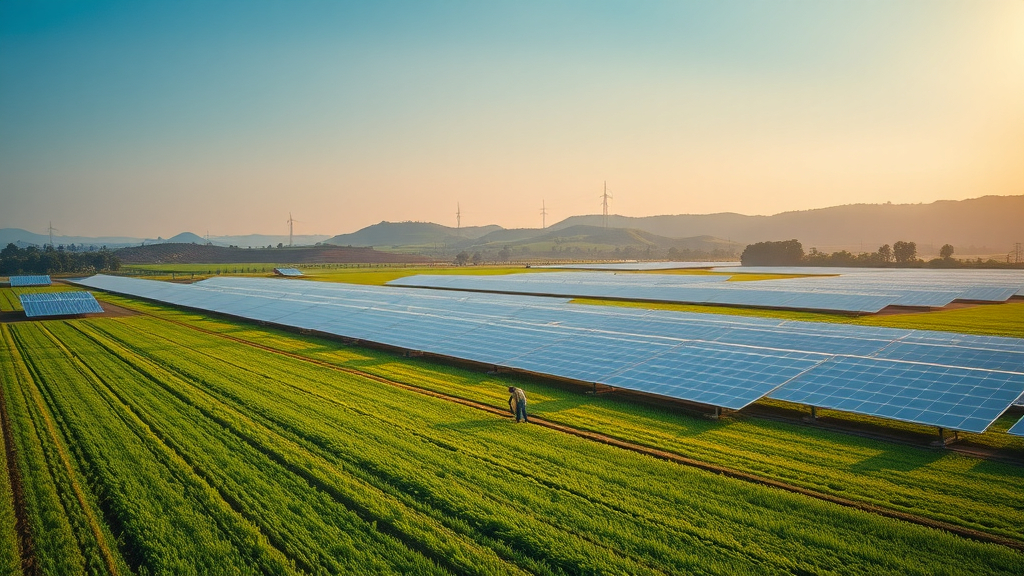What if Africa is the next frontier for global investment? With its burgeoning market and an eager workforce, investment opportunities in Africa are creating waves of excitement among investors. In this article, we delve into how the Fund for Export Development in Africa (FEDA) is positioning itself as a pivotal player in this burgeoning landscape.

Overview of Investment Opportunities in Africa
Africa has emerged as a dynamic investment destination characterized by a plethora of opportunities across various sectors. The continent's strong demographic profile, with a young and growing population, presents a unique opportunity for businesses looking to expand into new markets. Additionally, Africa's abundant natural resources, including minerals and agricultural potential, alongside concerted efforts by governments to stabilize economies and improve infrastructure, makes it an attractive option for investors.
Moreover, the increasing shift towards intra-African trade, as reinforced by organizations like FEDA, is set to enhance market accessibility and reduce dependence on foreign aid. Many countries are implementing policy frameworks aimed at creating a conducive environment for foreign investments, further boosting investor confidence.
The Role of FEDA in Africa's Economic Landscape
The Fund for Export Development in Africa (FEDA) plays a transformative role in shaping Africa's economic future by facilitating investments in various sectors vital to the continent's growth. FEDA is a part of Afreximbank and serves as a critical tool designed to bridge the funding gap in Africa, particularly in equity financing. This focus on equity allows firms engaging in intra-African trade and manufacturing to access the necessary capital for growth and innovation.
Understanding FEDA's Mission and Objectives
Established to implement equity investment across Africa, FEDA’s primary objective is to support industrialization and value-added export development. CEO Marlene Ngoyi emphasized this vision during Uganda's recent accession: “We look forward to deepening our engagements with the Government of Uganda and the private sector to mobilize capital and invest in the manufacturing and export-related sectors,” highlighting how FEDA’s mission aligns with national objectives of economic transformation.
Key Areas of Investment Focus
FEDA directs its investments towards sectors that offer substantial growth potential such as manufacturing, transport, agribusiness, and technology. The strategic focus on these key areas allows for a diversified approach, promoting sustainability and economic resilience. Additionally, FEDA ensures that its investment strategies address overarching challenges in Africa, such as infrastructure deficits and enhancing value chains.

Benefits of Investing in Africa
Investors can reap numerous benefits when venturing into Africa's investment landscape. Key among these advantages is the continent's impressive economic growth, with several African countries showing rapid GDP increases. This favorable macroeconomic environment translates to expanded market opportunities for investors.
Economic Growth and Market Potential
African nations are consistently achieving growth rates surpassing global averages. Statistics indicate that sectors like technology and consumer goods have seen a boom, driven by young populations and digital transformation. As noted by Ambassador Philip Rukikaire, “Africa needs more trade than aid,” underpinning the economic opportunity presented through active trade and investment.
Strategic Location and Resources
Africa's geographical advantages provide strategic access to global markets. With direct access to both the European and Asian markets, investors can leverage the continent’s resources to meet global demand. Additionally, the rich biodiversity and natural resources such as oil, gas, and minerals offer significant opportunities for investment.

Challenges and Considerations for Investors
While the prospects are promising, potential investors should be aware of the challenges inherent in the African economic landscape. Factors such as political stability, regulatory frameworks, and infrastructural challenges can impact the ease of doing business.
Political and Economic Stability
Political unrest and economic instability can deter investment. It's crucial for investors to conduct thorough market analyses and engage in risk assessments to understand the political climate in their target regions.
Infrastructure and Regulatory Environment
Weak infrastructural development remains a significant hurdle for many African nations. Investors are encouraged to seek out partnerships with local entities who understand the regulatory landscape and can navigate potential bureaucratic challenges effectively. For instance, the expansion of MRO capacity in regions like Zhuhai Jinwan highlights the importance of infrastructure in supporting investment growth.

Expert Insights on Investment Strategies
To further understand the nuances of investing in Africa, we turn to industry experts who provide valuable insights.
Marlene Ngoyi's Perspective on FEDA's Impact
According to Marlene Ngoyi, CEO of FEDA, investment in Africa must be strategic and focused on sectors that promote self-sufficiency and economic diversification. “We are committed to unlocking the immense potential of the region for sustainable development,” she stated, emphasizing FEDA's comprehensive investment strategy.
Ambassador Philip Rukikaire on Uganda's Economic Development
Ambassador Rukikaire stresses that Uganda’s accession to FEDA represents a cornerstone in the country's economic development journey, aimed at fostering a culture of industrialization and promoting intra-African trade as a means toward self-reliance.

Investment Opportunities by Sector
The diverse sectors within Africa present vast opportunities for investment. Each sector offers unique advantages that cater to different investor profiles.
Manufacturing and Export Development
The manufacturing sector remains a pillar of opportunity, particularly with Africa's push towards self-sufficiency. FEDA specifically focuses on providing capital for firms engaged in manufacturing and exports to amplify production capabilities across the continent.
Agribusiness and Food Security
Agriculture plays a crucial role in Africa's economies, providing employment and food security. Investments in agribusiness are increasingly vital, paving the way for innovations in food production and supply chain management. For example, NAM's solutions have been instrumental in overcoming air freight challenges in Kenya's flower trade, showcasing the potential of strategic investments in agribusiness.

Technology and Innovation
As digital transformation sweeps across Africa, opportunities in technology and innovation offer lucrative prospects. Investments in tech can lead to enhanced efficiencies and the emergence of start-ups that cater to local and global markets. The fintech revolution is a prime example of how mobile apps and AI are transforming financial management, opening new avenues for investment.
Transport and Logistics
Improving transportation infrastructure is key to enhancing trade and connectivity. Companies that invest in logistics can capitalize on the rising demand for efficient supply chain solutions within the continent.
How to Invest in Africa: A Step-by-Step Guide
For investors looking to secure a foothold in Africa’s thriving market, a structured approach is essential.
Identifying Investment Opportunities
Conducting thorough market research is vital. Investors should look for sectors experiencing growth and those with supportive governmental policies. Identifying local partners and understanding consumer behavior will significantly enhance investment success.
Navigating Regulatory Frameworks
It’s crucial to be well-versed with the local regulatory environment when investing in Africa. Engaging legal experts and local consultants can streamline compliance and reduce operational risks.

Building Partnerships with Local Entities
Establishing solid relationships with local businesses and stakeholders can create a more favorable investment climate. Collaborations can provide valuable insights about local customs and business practices.

People Also Ask
- Which African country is best for investment? The best country can vary based on industry; however, nations like Rwanda and Kenya are noted for their favorable business environments.
- What is the most profitable business in Africa? The agribusiness, technology, and renewable energy sectors are currently among the most profitable.
- How to invest in Africa as an American? Americans can invest directly through firms like FEDA or through partnerships with local entities.
- Is it smart to invest in Africa? Yes, with proper research and strategic planning, investing in Africa can yield substantial returns.
Key Takeaways
- Investment opportunities in Africa are vast and varied, with significant potential for growth.
- FEDA plays a crucial role in facilitating investments and fostering economic development.
- Investors must navigate challenges such as political stability and regulatory frameworks for successful operations.
- Partnerships with local entities are essential for understanding markets and achieving sustainable success.
Conclusion
Investment opportunities in Africa represent a promising frontier for global investors. As the continent embarks on its path of industrialization and increased intra-African trade, platforms like FEDA are instrumental in unlocking capital. Understanding the landscape thoroughly and forging the right partnerships can pave the way for success in this dynamic market.
Call to Action
Investors interested in exploring these opportunities should engage with local expertise and consider partnering with FEDA to maximize their impact in Africa's vibrant market. Start your investment journey today!
 Add Row
Add Row  Add
Add 




Write A Comment